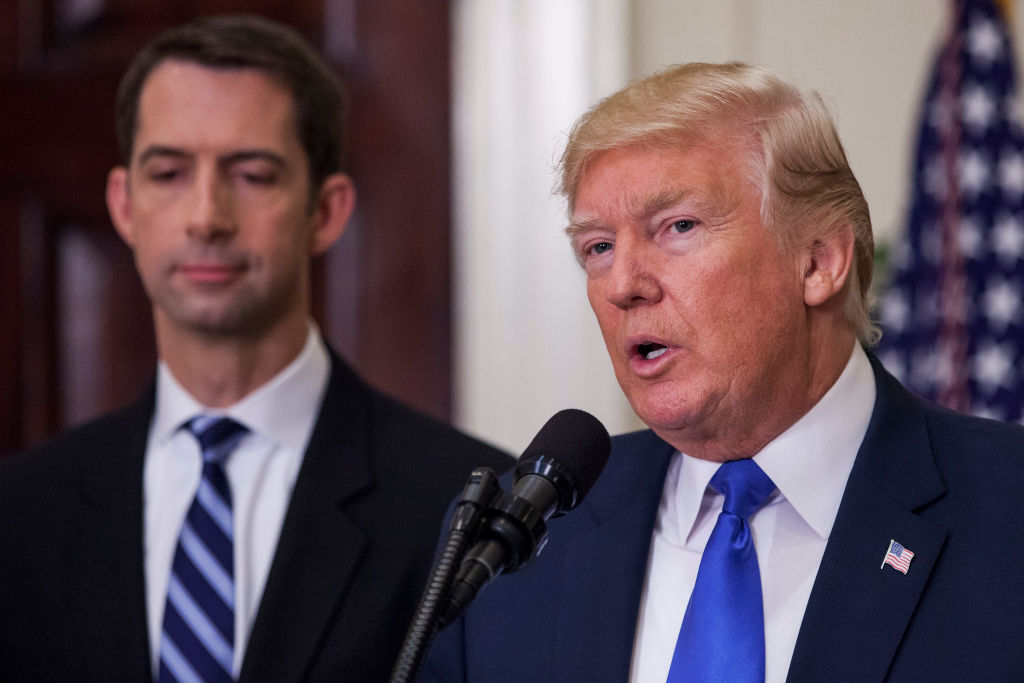Economist defends Trump-backed immigration bill as 'common sense'


When pressed for statistics to back up his rigid claims on immigration earlier this week, White House senior policy adviser Stephen Miller pointed to a study by Harvard economist George Borjas. Borjas had "opened up the old data and talked about how [low-skilled immigration] actually did reduce wages for workers," Miller told The New York Times' Glenn Thrush, who was pressing him over a new immigration proposal from Republican Sens. Tom Cotton (Ark.) and David Perdue (Ga.) that is backed by President Trump.
The proposal, dubbed the RAISE Act, would severely curb legal immigration by prioritizing applicants based on skills, including whether they can speak English. Some critics posited that Trump merely wants to have fewer immigrants, not more highly skilled ones, while others noted that the idea of a merit-based immigration system is antithetical to what the U.S. has historically stood for. But writing in Politico on Friday, Borjas himself defended the plan as "a clear and transparent framework" for immigration that is just "common sense":
The Cotton-Perdue bill would divvy up the 140,000 visas now assigned to the employment preferences by using a point system similar to those adopted and used for several decades in other countries, including Canada, Australia, and New Zealand. In rough terms, those point systems essentially grade visa applicants on the basis of personal characteristics, such as education, occupation, and age; add up the points; and grant an entry visa to those who "pass the test."
[...] In short, the bill provides a clear and transparent framework for determining which types of workers we believe to be most beneficial. And I suspect that most Americans would view the Cotton-Perdue approach as common sense. Do many of us really believe that America would benefit more by letting in a sociology professor in her 50s than by letting in a young woman with an advanced degree in computer science? [George Borjas, via Politico]
Furthermore, by prioritizing high-skilled immigrants, the bill would bring a workforce that better complements America's existing economy, Borjas writes, and result in an immigration system that is "economically more profitable." Read his entire opinion at Politico.
The Week
Escape your echo chamber. Get the facts behind the news, plus analysis from multiple perspectives.

Sign up for The Week's Free Newsletters
From our morning news briefing to a weekly Good News Newsletter, get the best of The Week delivered directly to your inbox.
From our morning news briefing to a weekly Good News Newsletter, get the best of The Week delivered directly to your inbox.
A free daily email with the biggest news stories of the day – and the best features from TheWeek.com
Kimberly Alters is the news editor at TheWeek.com. She is a graduate of the Medill School of Journalism at Northwestern University.
-
 TikTok secures deal to remain in US
TikTok secures deal to remain in USSpeed Read ByteDance will form a US version of the popular video-sharing platform
-
 Unemployment rate ticks up amid fall job losses
Unemployment rate ticks up amid fall job lossesSpeed Read Data released by the Commerce Department indicates ‘one of the weakest American labor markets in years’
-
 US mints final penny after 232-year run
US mints final penny after 232-year runSpeed Read Production of the one-cent coin has ended
-
 Warner Bros. explores sale amid Paramount bids
Warner Bros. explores sale amid Paramount bidsSpeed Read The media giant, home to HBO and DC Studios, has received interest from multiple buying parties
-
 Gold tops $4K per ounce, signaling financial unease
Gold tops $4K per ounce, signaling financial uneaseSpeed Read Investors are worried about President Donald Trump’s trade war
-
 Electronic Arts to go private in record $55B deal
Electronic Arts to go private in record $55B dealspeed read The video game giant is behind ‘The Sims’ and ‘Madden NFL’
-
 New York court tosses Trump's $500M fraud fine
New York court tosses Trump's $500M fraud fineSpeed Read A divided appeals court threw out a hefty penalty against President Trump for fraudulently inflating his wealth
-
 Trump said to seek government stake in Intel
Trump said to seek government stake in IntelSpeed Read The president and Intel CEO Lip-Bu Tan reportedly discussed the proposal at a recent meeting



